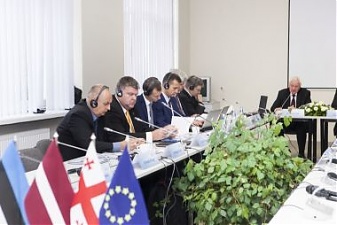Baltic Export, Baltic States – CIS, EU – Baltic States, Forum, Lithuania, Markets and Companies
International Internet Magazine. Baltic States news & analytics
Wednesday, 24.04.2024, 06:15
Baltic Assembly discusses impact of Russian embargo on economics
 Print version
Print version |
|---|
| Photo: seimas.lt |
Bronius Bauza, Chairman of the BA Economics, Energy and Innovations Committee, reviewed the situation in Lithuania, Latvia and Estonia after the European Union's sanctions on Russia and Russia's sanctions on the EU. The chairman stressed that EU member states were affected at different extent. The chairman highlighted the need to cooperate looking for new markets and technologies because the situation is not likely to change any time soon.
Janis Volberts, Head of Foreign Investment Attraction, Tourism and Export Promotion Division at the Ministry of Economics of Latvia, said that additional export promotion measures may include establishing foreign representations, national stands in international fairs, intensive activities of trade missions, special marketing measures, visits by foreign companies, targeted search for business partners etc.
Meelis Kitsing, Head of Economic Analysis Division of the Economic Development Department at the Ministry of Economic Affairs and Communications of Estonia, noted that in 2008-2014 Estonia's trade balance with Russia was positive but the situation worsened in the summer of 2014, when Russia imposed a ban on Estonian dairy and fisheries products. Nonetheless, it transpired that Russian sanctions did not have a significant impact on Estonian economics. According to Kitsing, what could have greater negative impact is the downfall of Russian economy.
Gina Jaugielaviciene, Director of Investment and Export Department at the Ministry of Economy of Lithuania, emphasised that although Lithuania incurred substantial losses due to the Russian import embargo on certain food and agricultural products from the EU, yet Lithuania remained one of the fastest growing economies of the EU. In 2014, Lithuania's economy grew by 2.9% and in 2015, it is expected to grow by 1.9%.
According to the director, the dependence of Lithuania's exporters on the Russian market is conditional – Lithuania's dairy and meat sectors were mostly directed to Russia, but are now gradually shifting towards other countries. Therefore, the effects of the embargo on Lithuania's GDP arising from the food industry's losses in Russia are not as high, similarly as in other Baltic States. The director said that Lithuania much more relied on re-export to Russia. In 2014 approximately 40% of re-export was carried by Lithuanian companies, i.e. re-exported goods accounted for as much as 88% of Lithuania's total export to Russia.
The second part of the event addressed genetically modified organisms (GMO) and related regulations.








 «The Baltic Course» Is Sold and Stays in Business!
«The Baltic Course» Is Sold and Stays in Business!

